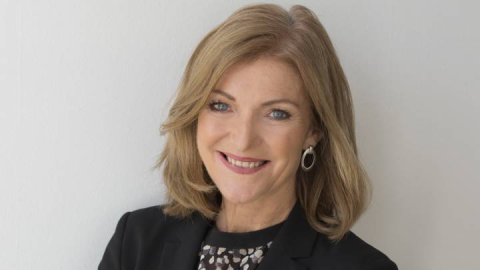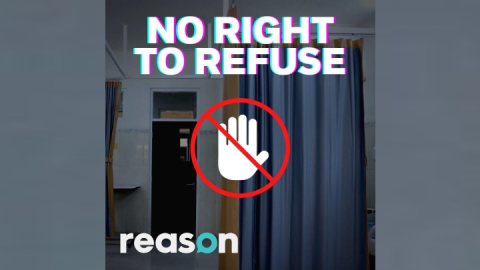Reason Party’s Fiona Patten on Public Religious Hospitals Denying Abortion in Victoria, Which Andrews Will Continue

The Victorian government voted down Reason MLC Fiona Patten’s legislation that aimed to prevent denominational hospitals, or publicly funded Catholic hospitals, from denying patients certain legally sanctioned procedures due to the religious doctrine the institution adheres to.
The Health Legislation Amendment (Conscientious Objection) Bill 2022 had sought to prevent publicly funded religious hospitals from placing blanket bans on the provision of certain procedures and services, and it came up for debate in the Victoria upper house on Wednesday.
“Right here and right now, in the Victorian public health system, women and gender-diverse people are being denied the right to contraception and abortion,” said Patten during her second reading speech on the bill.
“Similarly, Victorians in the public health system are being denied the right to access voluntary assisted dying,” she added. “The problem is of Catholic origin.”
However, despite recent concerns raised nationwide around the provision of abortions, the Andrews government saw fit to side with the opposition on 17 August and permit these religious hospitals, which are running on the taxpayer pursue, to continue to refuse lawful healthcare procedures.
Rising religious conservatism
Thousands took to the streets in Sydney and Melbourne in late June to protest against the US Supreme Court overturning the 1973 Roe versus Wade ruling, which had guaranteed the right to abortion nationally in that country.
And it was this development that brought the Victorian issue with denominational hospitals to the fore.
“My sense was that the loss of that principle in the USA felt like a loss to women and gender diverse people everywhere,” Patten further told parliament on 2 August.
“We felt acutely the stripping of autonomy and the debasement of women. It was a slap in the face to the gender equality that we continue to fight for.”
But Australia has also seen a rise in the Christian right at the national level over recent years, as the Morrison government had prioritised religious freedom laws, which would have served to strengthen the resolve of the Victorian denominational hospitals to refuse certain services.
Indeed, Morrison’s Religious Discrimination Bill initially carried a provision known as the health practitioner conduct rule that would have extended the right to refuse treatments to all healthcare workers regardless of where they were employed, including pharmacists.
“It’s not conscience”
Released last month, the 2021 Census figures revealed that Australia is no longer a cohesive Christian society.
In 1971, 86 percent of the population identified as Christian, which has now dropped to just under 44 percent. While those identifying as non-religious last year accounted for almost 39 percent of the population.
The bill that Patten had before parliament created an obligation for publicly funded denominational hospitals to provide reproductive healthcare and assisted dying services, so that practitioners working within these institutions willing to conduct such treatments could do so.
Sydney Criminal Lawyers spoke to Reason leader Fiona Patten just before her bill went up for the vote, and while she understood that the government may not take on the Church right before an election, she asserted that her campaign has put government on notice regarding this issue.

Fiona, you’ve recently launched the No Right to Refuse campaign, which aims to make it unlawful for publicly funded religious hospitals to refuse women and gender diverse people the right to abortions and contraception.
So, in your understanding, how prevalent is this practice in Victoria? And why should it be brought to an end?
The problem is that there is no official data on this. But our understanding is that it’s very prevalent, and since we started the campaign, we’ve been contacted by dozens of people telling their stories around these refusals.
The problem is that one of the major obstetrics and gynaecology hospitals in Melbourne is a Catholic hospital.
Now, they’re fully publicly funded, and we think that they shouldn’t be allowed to refuse a practitioner from providing a service that they believe the patient needs and the patient wants.
In order to see the practice brought to an end, you’ve introduced the Health Legislation Amendment (Conscientious Objection) Bill 2022. How do the proposed laws work?
This legislation doesn’t prevent a health practitioner with a conscientious objection to contraception or abortions from exercising that conscientious objection.
What it does is that it prevents hospital organisations from refusing to allow a practitioner from providing those services.
That’s an important distinction because we argue that these publicly funded hospitals are misusing conscientious objection. We would argue that an organisation doesn’t have a conscience, but an individual does.
The No Right to Refuse campaign has come in the wake of the US Supreme Court overturning the ruling in the 1973 case Roe versus Wade.
This saw the national right to abortion revoked in the States forty years after it had been established.
What are the likely outcomes of this development? And does it have bearing on this country?
I’m afraid that we need to be ever vigilant about these rights. Every year, we see hundreds of people turn up in Melbourne to campaign against abortion.
We have numerous politicians in Victoria who would back rollback our abortion laws here.
It is constantly under threat. But when you have some of the major hospitals in a state already refusing these kinds of services, then that needs to change, and Roe versus Wade really highlighted and allowed us to expose this refusal to reproductive healthcare that’s already occurring.
The Morrison government was attempting to enhance the practice that the No Right to Refuse campaign seeks to prevent.
Its first draft of the Religious Discrimination Bill contained a provision permitting all health professionals the right to refuse medical procedures if they conflict with their religious beliefs.
Due to public outcry, this provision was watered down in the second draft, and dropped in the final unpassed bill.
This proposal was out of step with the majority of the community. So, how do we account for these types of laws being a prioritisation of an Australian government?
They are completely out of step with Australian society. We know that well over 80 percent of Australians support people’s right to abortion as well as their right to voluntary assisted dying.
Institutions that deny that should not be supported in doing that. They should be doing quite the opposite, which is what my bill goes to.
It’s saying that those hospitals should actually respect the rights and consciences of not only the medical practitioners but also the patients that they are serving.
Do you think with the coming of the Albanese government, the local push in this direction will cease?
I’m not confident that we will see the Albanese government making great defensive steps in this area.
Prime minister Albanese has already said he doesn’t think abortion is a federal issue, he thinks it’s a state issue.
Well, I’ve got news for him, it’s not. If you looked at the Medicare funding of abortion, that’s a federal matter.
Certainly, the funding of public hospitals has also got a federal component. So, if hospitals aren’t providing the services that people are legally entitled to, should they get public funding?
That’s not only a state question, that’s also a federal question.
So, I don’t have great confidence that we are going to see Mr Albanese defending these rights.
Why are the Roe versus Wade decision and the religious freedoms campaign coming to a head at present?
In some ways, I feel like it is their last hurrah. We are an ever-growing secular society. We are becoming more and more opposed to religious privilege.
All Australians respect people’s right to believe in whatever they want. But that right has to go both ways.
So, that means that those who have religious beliefs need to respect the rights of those of us who don’t.
Roe versus Wade really highlighted that because we know that the opposition to abortion is religious. It is done on religious ideology.
And that’s what we’re saying about these public hospitals, that they’re refusal to allow certain services to be provided to patients is based on ideology. It is not a conscience. It is an ideology.
And lastly, Fiona, you’re set to bring on the bill for debate this week, and one of the other procedures you hope to prevent religious hospitals from refusing is voluntary assisted dying, which you instigated the legalisation of in Victoria.
What sort of reaction is the campaign receiving from the public? And what’s the political will like in this regard?
We’ve had overwhelming public support for this move. That is without a doubt. Whether the major parties will start a fight with the Catholic Church three months out from an election, is another question.
But it does put the government on notice that they need to consider how they fund public hospitals that refuse to provide services our citizens want.
If a private hospital wants to pick and choose what they provide, well, so be it. But when they are receiving public funding, they shouldn’t be allowed to deny legal services that patients need and want.








